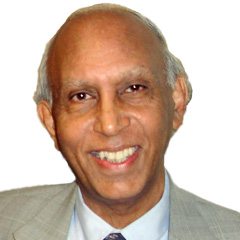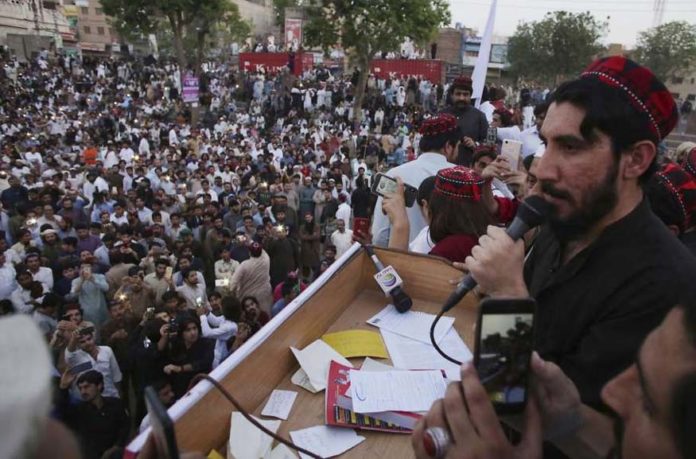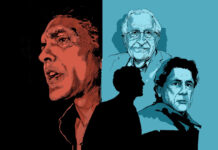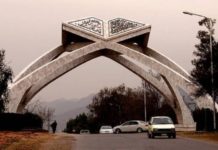Before leaving Lahore for Stockholm on March 17, I had promised a Pashtun student of mine that I shall take up the demands of the Pashtun Tahafuz Movement (PTM) for fair treatment by the state. PTM is the latest body of collective effort by citizens to claim redress of their grievances against what they allege is endemic discrimination, persecution and victimisation of Pashtuns. It is committed to peacefully protest what it alleges is recurrent oppression of Pashtuns.
Originally, when it was founded in 2014,it was called the Mehsud Tahafuz Movement. At that point,it demanded the removal of land mines which had been planted by the defence forces during their military action against those Taliban who were hostile to Pakistan. Those land mines, however, had been killing and maiming ordinary people as will. Why such land mines were laid in areas where citizens live and move about demands an explanation itself. Ordinarily, land mines are laid to prevent foreign forces advancing during war, but to lay them to contain an insurgency of irregulars and terrorists makes little sense, especially after they have been defeated by our military. The demand of the Pashtuns to remove them is perfectly reasonable.
However, the name of the organisation was changed to the Pashtun Tahafuz Movement (PTM) to express the concern of Pashtuns in general. After Naqibullah Mehsud, a young businessman and aspiring model was killed in Karachi in January 2018 in extra-judicial killing by notorious police officer, Rao Anwar. PTM has grown rapidly into a mass movement. It now embraces Pashtuns over a large swathe of Pakistani territory, extending from the Federally Administered Areas to Khyber-Pakhtunkhwa and Balochistan. The main demand of the PTM is respect of their human rights. It is demanding a cessation of disappearances and extrajudicial killing of Pashtuns and other abuses of power by state forces. It alleges that Pashtuns are humiliated at army check posts; they are portrayed as terrorists in Pakistani movies and in official documentaries; and, are racially profiled.
Although mainstream Urdu print media has been rather silent and television talk shows have paid scant attention to the grievances of the Pashtuns; English-languagenewspapers, however, have been quite vocal in asserting that alienating the Pashtuns would do Pakistan no good. Already in Balochistan, extrajudicial killings and disappearances have generated considerable violent conflict. Drawing the Pashtuns into it would serve no purpose.
The state encouraged the “martial traditions” of the Pashtuns by first sending them into Kashmir in late October 1947 – a decision which proved to be a disaster. Then again, they were drafted into the so-called Afghan jihad during the 1980s.
From a human rights standpoint, everyone is entitled to be treated with respect. His or her dignity and integrity, being beyond the arbitrary intrusion and violation by the state and its agencies. More importantly, everyone is entitled to defend his rights in a court of law, which includes being treated fairly in an independent court of law where the charges against him are impartially examined. Extrajudicial killing and disappearances are not only gross human rights violations, they constitute crimes against humanity.
It is comforting that the PTM has declared that it is committed to protesting violation of the rights of Pashtuns by state agencies peacefully. I have followed the statements of their leaders and spokespersons and found them consistent in not only making verbal declarations on using non-violent methods to agitate their grievances, but in practice have adhered to them as well. It is not surprising that the PTM is gaining support and pulling large crowds to its meetings. PTM leaders intend to bring their case to Lahore and other important places so that they can directly inform their fellow citizens about their demands for fair play and justice as loyal citizens of Pakistan.
In one sense, the PTM is reviving a tradition deeply embedded in their historical memory. When Mahatma Gandhi challenged British imperialism, he found support in the least expected quarters: among the Pashtuns, who in history and legend have been portrayed as a martial people, ever ready to resort to violence. Khan Abdul Ghaffar Khan and his Khudai Khidmatgars were able to defy such stereotyping of Pashtuns and established a disciplined mass following, which included women’s organisations. That after the creation of Pakistan that movement suffered considerable repression, is all too well-known. In fact, the state encouraged the “martial traditions” of the Pashtuns by first sending them into Kashmir in late October 1947 – a decision which proved to be a disaster. Then again, they were drafted into the so-called Afghan jihad during the 1980s. This bequeathed a continuing tradition of extremism, militancy and terrorism.
The emergence of the PTM is an indication that Pashtuns are fed up of extremism and terrorism. Once again, they are adhering to non-violent means and methods to protest their grievances. The Pakistani constitution permits such action, and it is perfectly legitimate according to all canons of civilized politics. They can serve as a role model for peacefully protesting injustice for the Baloch and others who have similar complaints about the way they are treated in Pakistan.
Having said that, I must underscore that it perfectly legitimate for Pakistan to curb all threats to its security and integrity. If credible evidence exists of such activity in the Pashtun territories, then the culprits should be arrested, charged in a court of law and tried. Those found guilty should be punished. Pakistan can ill afford antagonizing a major Pakistani nationality. It is time that the National Action Plan (NAP) is put into action. My own take is that all parts of Pakistan should be integrated into an effective federation where substantial autonomy to the provinces should be combined with an effective centre applying the same standards and policies and laws everywhere so that Pakistan can evolve as a coherent federation.
About the Author:

Dr. Ishtiaq Ahmed is Professor Emeritus of Political Science, Stockholm University; Visiting Professor Government College University and Honorary Senior Fellow, Institute of South Asian Studies, National University of Singapore. He can be reached at billumian@gmail.com








